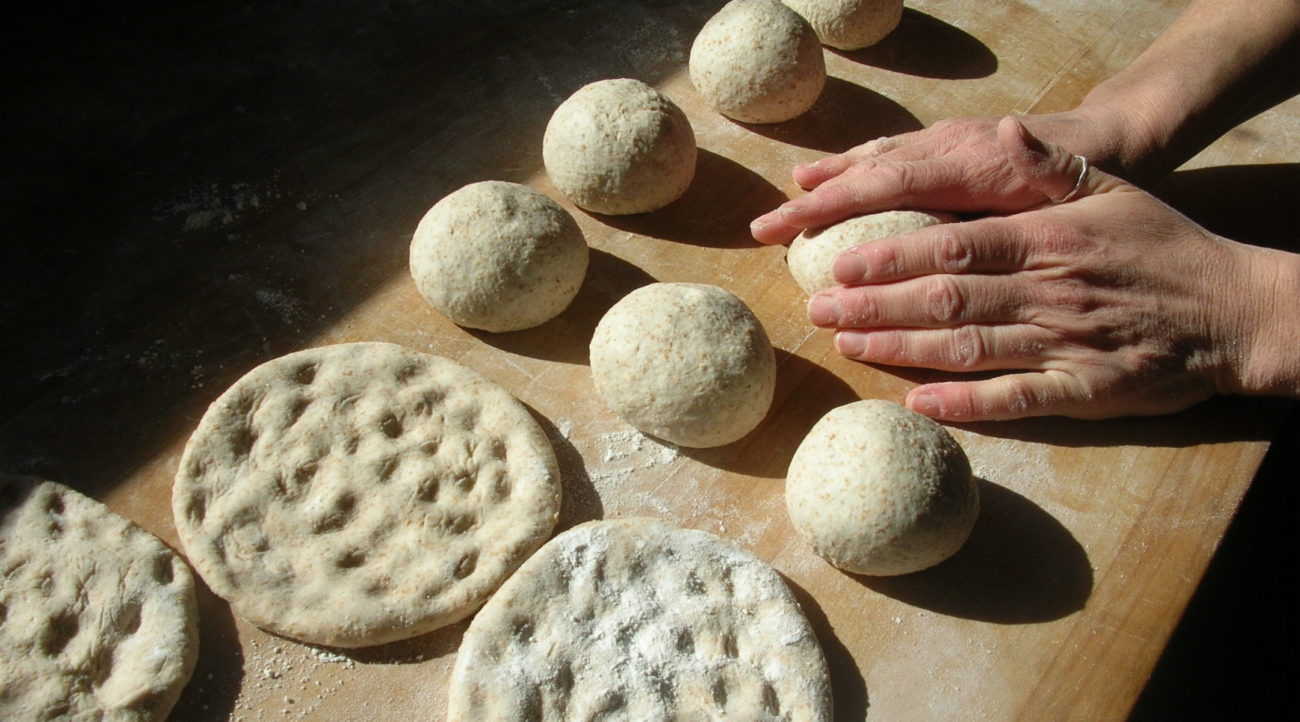Pesah Edition, P. 5
Today we are going to review some Matzah recipes:
אורח חיים, תנה:ה: נוהגין שלא ליתן מלח במצה, ונכון הדבר
משנה ברורה, תנה:מא: היינו קודם אפייה, אבל אחר אפיה ודאי שרי לקטוף פני המצה במי המלח ולהחזירם לתנור כמו שעושין בחול המועד
Orah Haim 455:5: The custom is not to add salt to the Matzah dough, and it is a correct practice.
Mishnah Berurah, 445:41: This refers to the dough before baking, but after it was baked it is unquestionably allowed to wet the Matzah with slat water and put it back in the oven [to bake] as is customary on Hol HaMoed.
תנה:ו: לש המצה בקצח ושומשמין ובמיני תבלין, כשרה כיון שיש בה טעם מצה
455:6: If one kneaded the dough with caraway, sesame seed, or other spices, it is kosher since it has Matzah flavor.
The commentators add here that according to Maimonides one cannot use such Matzah for the Seder nights, while the Shulhan Arukh holds that it is good even for the Seders.
אורח חיים, תנט:ב: לא יניחו העיסה בלא עסק ואפילו רגע אחד. וכל זמן שמתעסקים בו, אפילו כל היום אינו מחמיץ; ואם הניחו בלא עסק… הוי חמץ… רביעית שעה וחלק מעשרים מן השעה
Orah Haim 459:2: The dough should not be left without kneading for even a moment, and as long as it is kneaded, even all day long, it does not become Hametz. If it was left without kneading… it becomes Hametz… [that is] fourth of an hour plus one twentieth of an hour (18 minutes).
The famous 18 minutes rule, which many people believe applies to the full cycle of baking, from the moment of mixing the water and flour to the moment the Matzah is taken out of the oven, actually refers to the time which passes from the moment the dough remains idle, which is when it is put in the oven. Over time, the time frame has been limited because of concern that small intervals in the process will accumulate to 18 minutes, which is highly unlikely.
אורח חיים, תס:ה: אין עושין בפסח פת עבה טפח
משנה ברורה, תס:יז: אבל בפחות מטפח מותר… ובדיעבד אם כבר אפה יש מתירין אפילו בעבה טפח
Orah Haim 460:5: One is not allowed to bake on Pesah a Matzah which 4 inches thick.
Mishnah Berurah 460:17: But less than 4 inches is allowed… if one already baked some allow [toeat the Matzah] even if it 4 inches thick.
אורח חיים, תסא:ד: יוצא אדם במצה שרויה והוא שלא נימוחה
ביאור הלכה, תסא:ד: …מפירוש רש”י משמע דאפילו נתמסמסה, כל זמן שלא נימוחה לגמרי יוצא בה, ועיין בב”ח דמשמע שמצדד כן להלכה וכן משמע בביאור הגר”א
Orah Haim 461:4: One can fulfil the Mitzvah of Matzah [on Seder nights] with soaked Matzah, as long as it did not completely dissolve.
Beur Halakha: From Rashi’s commentary it seems that even if it broke into crumbles it is fine, as long as it is not dissolved, and see Bait Hadash (R. Yoel Sirkis) who holds that this is the Halakha, and so it seems from the commentary of the Gaon of Vilna.
How did the Ashkenazi communities get from this Halakha to not eating gebrokht (wet matzah)? One theory I heard relates it to the Kitniyot prohibition. Since rice and other substitutes were not used in Ashkenazi communities, they had to bake large quantities of Matzah. The Matzah was baked in haste, without modern technology, and was very thick, as mentioned in the previous paragraph. As a result, many Matzot had pockets of unbaked dough in them. This of course can never happen with our paper thin, burned to perfection Matzah, but the prohibition against wetting Matzah is, for many Ashkenazi Jews, here to stay.








Ohr HaChaim Yomi – Emor